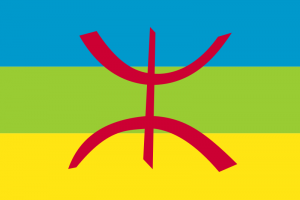Language/Standard-moroccan-tamazight/Grammar/Adverbs-of-Time-and-Frequency
As a beginner in Tamazight, you have already learned about adjectives and how to agree with them in previous lessons. Now, it's time to take your language skills to the next level and learn about adverbs of time and frequency. Adverbs are words that modify verbs, adjectives, or other adverbs in a sentence. Adverbs of time and frequency are used to describe the timing or frequency of an action or event in Tamazight.
Before we dive into the specifics of adverbs of time and frequency, let's review some basic Tamazight grammar rules.
Tamazight sentences follow a Subject-Verb-Object (SVO) structure. For example:
- Tara (subject) tkal (verb) ajjer (object) - Tara eats breakfast.
Tamazight pronouns include:
After mastering this lesson, these related pages might interest you: Irregular Past Tense Verbs & Basic Sentence Structure.
| Personal Pronouns | Possessive Pronouns |
|---|---|
| Ana (I) | nni (my) |
| Anta (you) | nnak (your) |
| Asmi (he) | nnih (his) |
| Asmi (she) | nnih (her) |
| Nekwni (we) | nnanu (our) |
| Nekwnex (you all) | nnax (your) |
| Anegh (they) | nnegh (their) |
Now that you have a better understanding of Tamazight grammar, let's talk about adverbs of time and frequency!
Adverbs of Time
Adverbs of time are used to describe the timing of an action or event in Tamazight. These adverbs can be placed either at the beginning or end of a sentence. Some common adverbs of time include:
| Tamazight | English Translation |
|---|---|
| Amdakl (now) | now |
| Yeddan (yesterday) | yesterday |
| Asmi (tomorrow) | tomorrow |
| Ilaqdama (in the past) | in the past |
| Awma (currently) | currently |
| Darna (we did) | we did (in the past) |
| Umma (soon) | soon |
| Tifawt (forever) | forever |
Here are some examples:
- Tara adda (now) tkal ajjer.
- Tara is eating breakfast now.
- Azul d yeddan n tkatit (yesterday at noon) sedda oassas fen.
- Yesterday at noon, the clock struck five.
- Tura asmi (tomorrow) dcar (we will) nebghu (want) njem3u (to sleep).
- Tomorrow we will want to sleep early.
Adverbs of Frequency
Adverbs of frequency are used to describe how often an action or event occurs in Tamazight. These adverbs are placed before the verb in the sentence. Some common adverbs of frequency include:
| Tamazight | English Translation |
|---|---|
| Kan (always) | always |
| War (sometimes) | sometimes |
| Ma yella/mayellaw (never) | never |
| Tfelt (rarely) | rarely |
| F tamurt (in the country) | in the countryside |
| F gar n tnegh (at home) | at home |
Here are some examples:
- Tara kan (always) tkal ajjer n tizi ahancal.
- Tara always eats breakfast in the morning.
- War tura (sometimes) ttacu (he calls) mu tayri.
- Sometimes he calls me in the evening.
- Ma yella (never) tura fad (he watched) awal ameqran.
- He never watched the first Star Wars movie.
Learning adverbs of time and frequency will help you better express yourself in Tamazight. But remember, practice makes perfect! Keep practicing and using these adverbs in various situations to become more proficient in Tamazight.
Other Lessons
- Regular Future Tense Verbs
- Conditional Mood
- Regular Past Tense Verbs
- Give your Opinion
- Alphabet and Pronunciation
- Future Tense
- Possessive Adjectives
- Irregular Past Tense Verbs
- Masculine and feminine nouns

